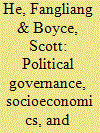|
|
|
Sort Order |
|
|
|
Items / Page
|
|
|
|
|
|
|
| Srl | Item |
| 1 |
ID:
191416


|
|
|
|
|
| Summary/Abstract |
Effective greenhouse gas (GHG) emission reduction policies require integration across both vertical and horizontal political jurisdictions. However, there remains much ambiguity about integrating these strategies across subnational jurisdictions because of knowledge gaps in quantifying the factors affecting emission variation across these jurisdictions. To address this, we modeled the effects of government policy, socioeconomics, and weather on GHG emissions from electricity, natural gas, and petrol for the average household in Canadian city and province jurisdictions, respectively, from 1997 to 2009. The percentage of GHG variation explained by our models ranged from 60.6% to 98.3% for cities and 71.1%–99.3% for provinces. The variation partitioning showed that socioeconomics was the most important variable category, accounting for 15.6%–49.0% of emission variation in cities and 66.6%–75.2% in provinces. Government policy was only significant at the city level, accounting for at most 4.8% of emission variation, but had joint contributions with other variable categories, particularly socioeconomics. Overall, the factors affecting residential GHG emissions changed from the city to provincial jurisdictions and the extent of these changes differed across energy sources. These findings stress the importance of integrating locally based, energy source specific policies into subnational and national based strategies for effective emission reductions.
|
|
|
|
|
|
|
|
|
|
|
|
|
|
|
|
| 2 |
ID:
186454


|
|
|
|
|
| Summary/Abstract |
Quantifying the effects of political, socioeconomic, and weather factors on greenhouse gas (GHG) emissions is vital for successful climate change mitigation and adaptation. We modeled these effects on provincial per-capita GHG emissions across Canada from 1990 to 2019. The results showed the percentage of variation in GHG emissions explained by the models ranged from 75.3% to 98.8% across the ten Canadian provinces. Socioeconomics was associated with most of the emission variation (46.1%), followed by weather (1.4%). The effect of political governance on GHG emissions was minor (0.7%) and inconsistent but had a strong interaction with socioeconomic factors. Energy use efficiency was identified to be the most influential factor, contributing to lowering emissions in eight provinces. We conclude that socioeconomic factors are most important in causing GHG emissions across Canada, while the importance of political governance is trivial, much to the chagrin of those making election promises. Investment in energy efficient technologies should have the highest return in reducing emissions.
|
|
|
|
|
|
|
|
|
|
|
|
|
|
|
|
|
|
|
|
|